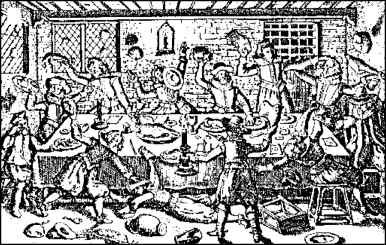Disorder (2)
A Renaissance food fight offers another powerful symbol of disorder: as the Last Supper is a symbol of human in harmony with God, so the riotous banquet expresses disharmony.
Shakespeare's disorderly banquets
Old Capulet has to assert all the power of authority that age gives him in order to ensure that his masque does not degenerate into disorder--the fiery Tybalt recognises Romeo and wants to challenge him, but Capulet insists there be no "mutiny" among his guests (Romeo and Juliet, 1.4.82).
In Macbeth, the newly crowned Macbeth and Lady Macbeth invite the nobility of Scotland to a banquet--just after Macbeth has had Banquo murdered. At the beginning, Macbeth invites the lords to sit according to their status: "You know your own degrees; sit down." A few lines later Banquo's ghost enters, visible only to Macbeth; after a harrowing series of exchanges that no-one but he understands, Lady Macbeth accuses her husband of "[breaking] the good meeting / With most admired disorder," and asks the assembled lords to leave abruptly: "at once, good night. / Stand not upon the order of your going" (3.4.1,109-19).
In The Tempest, Prospero taunts the lords of Milan and Naples "men of sin," with a banquet that disappears:
Thunder and lightning. Enter ARIEL, like a harpy; claps his wings upon the table; and with a quaint device the banquet vanishes.
(3.3.51-3)
